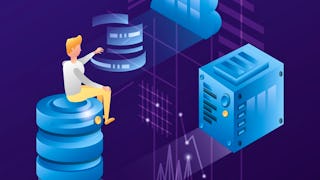- Browse
- Linux Commands
Results for "linux commands"
 D
DDuke University
Skills you'll gain: Serverless Computing, Amazon Web Services, Rust (Programming Language), Debugging, Application Deployment, Development Environment, Linux
Beginner · Guided Project · Less Than 2 Hours
 Status: Free TrialFree TrialJ
Status: Free TrialFree TrialJJohns Hopkins University
Skills you'll gain: Big Data, Apache Hadoop, Data Infrastructure, Data Processing, Analytics, Data Science, Distributed Computing, Linux, Software Installation, Scalability, System Configuration
Intermediate · Course · 1 - 4 Weeks
 Status: Free TrialFree Trial
Status: Free TrialFree TrialSkills you'll gain: Ansible, Git (Version Control System), Docker (Software), Containerization, SonarQube, Kubernetes, CI/CD, GitHub, Version Control, Application Deployment, Jenkins, DevOps, Continuous Integration, Continuous Deployment, Infrastructure as Code (IaC)
4.3·Rating, 4.3 out of 5 stars7 reviewsIntermediate · Course · 1 - 4 Weeks
 Status: Free TrialFree Trial
Status: Free TrialFree TrialSkills you'll gain: Prompt Engineering, Microsoft Copilot, Docker (Software), ChatGPT, Google Gemini, OpenAI, AI Workflows, Development Environment, GitHub, Integrated Development Environments, Generative AI Agents, Generative AI, Git (Version Control System), Debugging
4.9·Rating, 4.9 out of 5 stars15 reviewsIntermediate · Course · 1 - 3 Months
 Status: Free TrialFree Trial
Status: Free TrialFree TrialSkills you'll gain: Data Storage Technologies, Data Storage, File Systems, Information Management, Data Centers, Servers, Data Management, Disaster Recovery, Data Integrity, Infrastructure Architecture, Enterprise Architecture, Configuration Management, System Configuration, Scalability
Beginner · Course · 1 - 3 Months
 Status: Free TrialFree Trial
Status: Free TrialFree TrialSkills you'll gain: Cloud Deployment, Software Development Methodologies, Open Web Application Security Project (OWASP), CI/CD, Application Deployment, DevOps, Development Environment, Ansible, TCP/IP, Docker (Software), OSI Models, Cloud Infrastructure, General Networking, Computing Platforms, Application Programming Interface (API), Version Control, Network Administration, Software Design Patterns, JSON, Software-Defined Networking
Intermediate · Specialization · 1 - 3 Months
 B
BBirla Institute of Technology & Science, Pilani
Skills you'll gain: Computer Architecture, Computer Systems, Computational Logic, Hardware Design, Computer Hardware, Programming Principles, Digital Signal Processing, Debugging
4.3·Rating, 4.3 out of 5 stars10 reviewsBeginner · Course · 1 - 3 Months
 Status: Free TrialFree Trial
Status: Free TrialFree TrialSkills you'll gain: Secure Coding, Application Security, Authorization (Computing), Authentications, Data Validation, Role-Based Access Control (RBAC), Verification And Validation, Security Controls, User Accounts, Configuration Management, Package and Software Management, Cybersecurity, Data Loss Prevention, Identity and Access Management, Software Installation, Middleware, Debugging, Computer Programming, Information Technology, Dependency Analysis
4.6·Rating, 4.6 out of 5 stars19 reviewsBeginner · Course · 1 - 3 Months

Skills you'll gain: Kubernetes, Microservices, Docker (Software), Containerization, Application Deployment, Google Cloud Platform, Software Architecture, Systems Architecture, Cloud Applications
4.6·Rating, 4.6 out of 5 stars22 reviewsIntermediate · Project · Less Than 2 Hours
 Status: NewNewStatus: Free TrialFree Trial
Status: NewNewStatus: Free TrialFree TrialSkills you'll gain: AWS Kinesis, AWS SageMaker, AWS CloudFormation, Data Quality, Docker (Software), Data Pipelines, AWS Identity and Access Management (IAM), Data Security, Database Systems, Databases, Cloud-Native Computing, Version Control, Apache Spark, Cloud Engineering, Apache Airflow, Data Modeling, Cloud Security, Data Storage, Cloud Storage, Data Processing
4.1·Rating, 4.1 out of 5 stars7 reviewsBeginner · Specialization · 1 - 3 Months
 Status: NewNewStatus: Free TrialFree TrialP
Status: NewNewStatus: Free TrialFree TrialPPearson
Skills you'll gain: Package and Software Management, Linux Administration, Linux, Linux Commands, Operating System Administration, OS Process Management, Systems Administration, Remote Access Systems, System Configuration, Network Administration, General Networking, Software Installation, Network Protocols
Intermediate · Course · 1 - 4 Weeks
 Status: Free TrialFree Trial
Status: Free TrialFree TrialSkills you'll gain: GitHub, Git (Version Control System), Version Control, DevOps, Amazon Web Services, Collaborative Software, Continuous Integration, Linux, Code Review, Command-Line Interface
Beginner · Course · 1 - 3 Months
In summary, here are 10 of our most popular linux commands courses
- Building Rust AWS Lambda Microservices with Cargo Lambda: Duke University
- Big Data and Hadoop Foundations and Setup: Johns Hopkins University
- Advanced Git and GitHub Practices: Packt
- GitHub Copilot & ChatGPT for Devs - Code Smarter in 2024: Packt
- Data Storage Fundamentals with IBM Storage Scale: IBM
- Cisco Certified DevNet Associate (200-901): Packt
- Introduction to Computing Systems: Birla Institute of Technology & Science, Pilani
- Laravel: Configure, Validate, Authenticate and Authorize: Infosec
- Migrating a Monolithic Website to Microservices on Google Kubernetes Engine: Google Cloud
- AWS Certified Data Engineer Associate Exam Prep: LearnKartS










